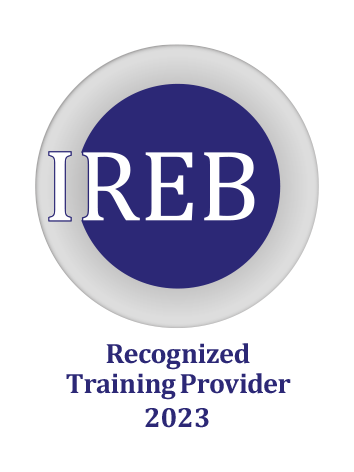The International Requirements Engineering Board (IREB) is an international nonprofit organization that focuses on the further professionalization of the Requirements discipline. (Equivalent to ISTQB in testing.) Within IREB are requirements engineering experts like Chris Rupp and Suzanne Robertson member of the international board.
Meanwhile IREB developed a certification program for Requirement Engineering (CPRE). The internationally recognized examinations are conducted by the International Software Quality Institute (iSQI).
The curriculum has three levels: Foundation Certificate, Advanced Certificate and Expert Certificate
This course prepares you for the exam “Certified Professional for Requirements Engineering – Advanced Level, Modeling" and meets the requirements as set down by IREB. You will learn international standards, methods and techniques in the field of Requirements Modeling.
In this three-day training you will learn about Requirements Engineering from both theoretical and practical perspective. Exercises and forming opinion are an important part in this course. During the course you will practice test exams. It is recommended to prepare for the exam by studying the curriculum in the evenings.The certification is made up of two parts and is optional. The written exam, which forms the first part takes place at a separate day after the training. The second part of the certification relates to the application of the learned material by means of a practical assignment. This is not part of the course and is conducted by an independent examiner.

This training is suitable for you if you are involved in Requirements Engineering and Management wish to delve further in Modeling of Requirements
Each participant will be faced with following specific targets:
This training is suitable for you if you are involved in Requirements Engineering and Management wish to delve further in modeling of Requirements:
Candidates for the CPRE Advanced Level module examination must already have received the CPRE Foundation Level certificate.
Throughout the course, an accredited trainer and requirements engineering expert provides lectures and gives exercises based on real world projects.
Different mock exams ensure an optimal preparation for the real certification exam.
Courses can be given in English or in Dutch. Course material is in English.
The course and the exam are offered in cooperation with our partner Improve QS.
The course duration is 3 days.
The exam (optional) is organised at the end of the 3rd day.
Exams are available in English.
This course can be given at the client’s site or at CTG.
Pricing
€ 1750/person for 3 days. All prices are exclusive of the exam fee, which is subject to change. At the time of publishing the exam fee is € 600 per person. All prices are VAT excluded; course material, lunch and beverages included.
Cancellation
By Participant: If a subscribed course participant is replaced by another participant or if the public course is postponed to a later date, no cancellation costs apply. A participant or a group that fails to attend, or that cancels a course without at least 15 working days written notice prior to the course start, is liable for the full subscription cost.
By CTG: CTG reserves the right to cancel a course at any time.
Course Logistics
All classroom courses begin promptly at 9 am and are scheduled until 5 pm.
All courses are organized at the CTG premises in Diegem (Belgium) or can be given at the client site and are available for groups as well. Please contact us if you wish further information.
The standard language of each course is English.
Knowledge of requirement sources
Principles of requirements modeling
Context modeling
Modeling an information structure
Modeling dynamic aspects
Scenario modeling
Exam (optional)
CTG Belgium NV
Culliganlaan 1D
1831 DIEGEM
Belgium
phone: +32 2 720 51 70
fax: +32 2 725 09 20
Buffalo,New York
300 Corporate Parkway
Suite 214N
Amherst, NY 14226
phone: +1 716 882 8000
fax: +1 716 887 7464